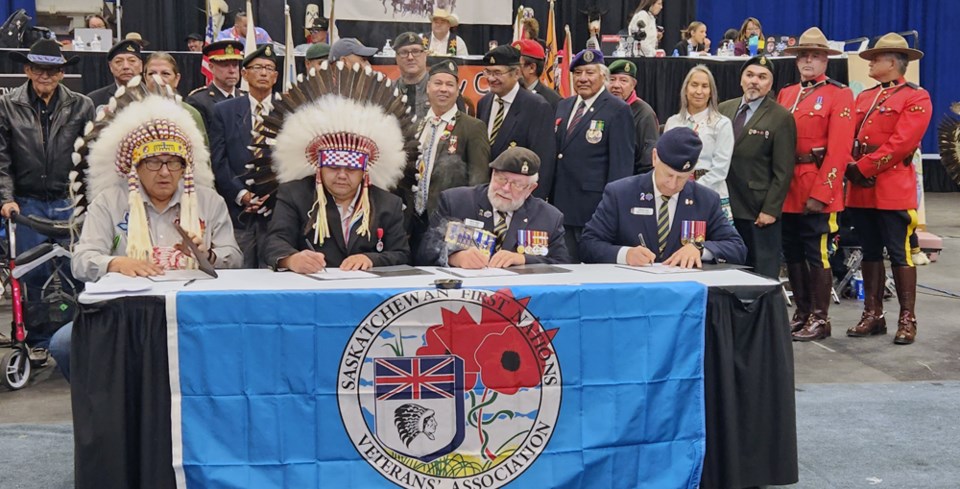SASKATOON — Saskatchewan First Nations Veterans Association Grand Chief David Raymond Gamble is pleased that Indigenous Peoples who served in the Canadian Armed Forces are now going to be treated equally as their efforts are finally recognized by the Royal Canadian Legion.
Gamble, along with Federation of Sovereign Indigenous Nations Second Vice Chief Edward “Dutch” Lerat, led the signing of a memorandum of understanding between SFNVA and the RCL, represented by Dominion President Bruce Julian and National Executive Director Steven Clark on Saturday, Oct. 22, at the SaskTel Centre.
Gamble said the MOU will have all First Nations veterans getting the same benefits and services received by their brothers and sisters in arms, who were either injured or sacrificed their lives in various conflicts to keep peace and preserve freedom. Facilities for medical and mental health are some of the services that would be made available to SFNVA members.
“It will bring everyone together. It means inclusion for us and there will no longer be any separation. In the past, there have been exclusions with Indigenous veterans noticing it all too well,” said Gamble.
“When they came home from wars, they were sent back to their First Nations [reserves] and they can’t go to towns with their buddies. They couldn’t celebrate with their buddies and they were not given any land like their buddies. Non-Indigenous Peoples were given lands.”
He added that the MOU signing has broken the barriers that prevent Indigenous veterans from getting the services they needed to help them deal with their injuries, post-traumatic stress disorder and problems that they encounter in their everyday lives.
“We want to be equal. So, we invited the [RCL] and the Saskatchewan First Nations to join forces and lobby the government to set aside funding for us. So we can have our funds for the healthcare of [Indigenous] veterans that come home sick or injured with some of them suffering from PTSD,” said Gamble.
“In the old days, some of the veterans were scared to ask for help. Some of them don’t want to ask for help. Now, with us calling it the Burns Way Project, everybody knows that it is attached to a First Nation person that gave their life for those little children. Hopefully, this will give them the courage to come forward to say, ‘I’m a First Nation veteran and I need help.’”
He is hopeful that First Nations veterans would have the courage to ask where to get the needed services to help them deal with their medical and mental health issues as he looks forward to having the funds distributed equally to Indigenous communities in the province.
“Nobody has to be afraid of what colour your skin is, how old you are or what you are. Navy, Air Force, or Army, we are all equal. We are now looking ahead to future generations [of service members] because most of the issues will be psychological, mental health,” Gamble said.
“A lot of them got beat up in the past. Some of our veterans never came home. Some suffered injuries and experienced trauma. A lot of them are dealing with issues inside their head and we want to provide the services for them in that capacity. We want to provide more resources for them.”



